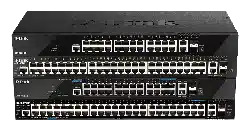Loading ...
Loading ...
Loading ...

DGS-1520 Series Gigabit Ethernet Smart Managed Switch Web UI Reference Guide
80
The fields that can be configured are described below:
Parameter Description
Profile Name
Enter the profile name here. This string can be up to 32 characters long.
Format String After clicking the Edit button, enter the Expert UDF format type string for DHCPv6
Option 37 here. This string can be up to 251 characters long.
The following rules need to be considered:
• This string can be a hexadecimal value, an ASCII string, or any combination
of hexadecimal values and ASCII characters. An ASCII string needs to be
enclosed with quotation marks ("") like "Ethernet". Any ASCII characters
outside of the quotation marks will be interpreted as hexadecimal values.
• A formatted key string is a string that should be translated before being
encapsulated in the packet. A formatted key string can be contained both
ASCII strings and hexadecimal values. For example, "%" +"$"+"1~32"+
"keyword"+":":
o % - Indicates that the string that follows this character is a formatted
key string.
o "$" or "0" - (Optional) Indicates a fill indicator. This option specifies
how to fill the formatted key string to meet the length option. This
option can be either "$" or "0", and cannot be specified as both at the
same time.
"$" - Indicates to fill the leading space (0x20).
"0" - Indicates to fill the leading 0. By default, this option is
used.
o 1~32 - (Optional) Indicates a length option. This specifies how many
characters or bytes the translated key string should occupy. If the
actual length of the translated key string is less than the length
specified by this option, a fill indicator will be used to fill it. Otherwise,
this length option and fill indicator will be ignored and the actual
string will be used directly.
o keyword - Indicates that the keyword will be translated based on the
actual value of the system. The following keyword definitions
specifies that a command will be refused if an unknown or
unsupported keyword is detected:
devtype - The model name of the device. Only an ASCII
string is allowed.
sysname - Indicates the System name of the Switch. Only an
ASCII string is allowed.
ifdescr - Derived from ifDescr (IF-MIB). Only an ASCII string
is allowed.
portmac - Indicates the MAC address of a port. This can be
either an ASCII string or a hexadecimal value. When in the
format of an ASCII string, the MAC address format can be
customized using special CLI commands. When in the format
of a hexadecimal value, the MAC address will be
encapsulated in order in hexadecimal.
sysmac - Indicates the system MAC address. This can be
either an ASCII string or a hexadecimal value. In the ASCII
string format, the MAC address format can be customized
using special CLI commands. In the hexadecimal format, the
MAC address will be encapsulated in order in hexadecimal.
unit - Indicates the unit ID. This can be either an ASCII string
or a hexadecimal value. For a standalone device, the unit ID is
0.
module - Indicates the module ID number. This can be either
an ASCII string or a hexadecimal value.
port - Indicates the local port number. This can be either an
ASCII string or a hexadecimal value.
Loading ...
Loading ...
Loading ...
